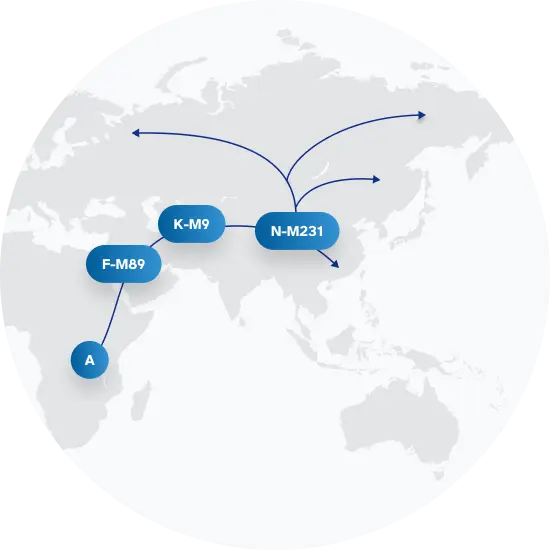Explore the Family Name Hastings
How common is the last name Hastings in the United States?
Based on the Decennial U.S. Census data, the surname Hastings saw a minor shift in popularity between 2000 and 2010. In 2000, Hastings was ranked at 1,183, but dropped to 1,253 by 2010, representing a decline of approximately 5.92%. Despite this slight decrease in rank, the number of individuals with the Hastings name increased from 27,201 in 2000 to 28,015 in 2010, an increase of roughly 2.99%. However, when looking at the proportion per 100,000 people, there was a small dip from 10.08 in 2000 to 9.5 in 2010, a decrease of about 5.75%.
| 2000 | 2010 | Change | |
|---|---|---|---|
| Rank | #1,183 | #1,253 | -5.92% |
| Count | 27,201 | 28,015 | 2.99% |
| Proportion per 100k | 10.08 | 9.5 | -5.75% |
Race and Ethnicity of people with the last name Hastings
In terms of ethnicity, the Decennial U.S. Census data indicates that the majority of individuals carrying the Hastings surname identified as White, although this percentage decreased slightly from 91.32% in 2000 to 88.99% in 2010. During the same period, there were notable increases in the percentages of those identifying as Asian/Pacific Islander, Two or More Races, Hispanic, and Black. Specifically, those identifying as Hispanic saw the largest increase, up 53.41%, followed by those of Two or More Races, which increased by 48.36%. Those identifying as Asian/Pacific Islander and Black saw increases of 20.00% and 15.23% respectively. The percentage of those identifying as American Indian and Alaskan Native also saw a modest growth of about 5.00%.
| 2000 | 2010 | Change | |
|---|---|---|---|
| White | 91.32% | 88.99% | -2.55% |
| Black | 4.4% | 5.07% | 15.23% |
| Hispanic | 1.76% | 2.7% | 53.41% |
| Two or More Races | 1.22% | 1.81% | 48.36% |
| American Indian and Alaskan Native | 0.8% | 0.84% | 5% |
| Asian/Pacific Islander | 0.5% | 0.6% | 20% |
Hastings ancestry composition
23andMe computes an ancestry breakdown for each customer. People may have ancestry from just one population or they may have ancestry from several populations. The most commonly-observed ancestry found in people with the surname Hastings is British & Irish, which comprises 56.5% of all ancestry found in people with the surname. The next two most common ancestries are French & German (22.8%) and Eastern European (4.3%). Additional ancestries include Scandinavian, Italian, Spanish & Portuguese, Ashkenazi Jewish, and Indigenous American.
Ready to learn more about your ancestry? Get the most comprehensive ancestry breakdown on the market by taking our DNA test. Shop 23andMe
| ANCESTRY BREAKDOWN | COMPOSITION |
|---|---|
| British & Irish | 56.5% |
| French & German | 22.8% |
| Eastern European | 4.3% |
| Other | 16.4% |

Possible origins of the surname Hastings
Your DNA provides clues about where your recent ancestors may have lived. Having many distant relatives in the same location suggests that you may all share common ancestry there. Locations with many distant relatives can also be places where people have migrated recently, such as large cities. If a large number of individuals who share your surname have distant relatives in a specific area, it could indicate a connection between your surname and that location, stemming from either recent ancestral ties or migration.
Based on 23andMe data, people with last name Hastings have recent ancestry locations in the United Kingdom of Great Britain and Northern Ireland and Ireland.
| RECENT ANCESTRY Location | Percentage |
|---|---|
| Greater London, United Kingdom | 89.50% |
| Greater Manchester, United Kingdom | 89.40% |
| West Midlands, United Kingdom | 89.40% |
| West Yorkshire, United Kingdom | 89.10% |
| Merseyside, United Kingdom | 88.90% |
What Hastings haplogroups can tell you
Haplogroups are genetic population groups that share a common ancestor on either your paternal or maternal line. These paternal and maternal haplogroups shed light on your genetic ancestry and help tell the story of your family.
The top paternal haplogroup of people with the surname Hastings is N-CTS2929, which is predominantly found among people with European ancestry. Haplogroup N-CTS2929 is descended from haplogroup N-M231. Other common haplogroups include I-Z140 and I-L22, which are predominantly found among people with European and European ancestry. Other surnames with similar common haplogroups are: Anderson, Nelson, Johnson, Smith, White, Wilson, King, Thompson, Brown, Gustafson.
The most common maternal haplogroups of people with Hastings surname are: H1, T2b, H. These most commonly trace back to individuals of European ancestry.
 Paternal Haplogroup Origins N-M231
Paternal Haplogroup Origins N-M231
Your paternal lineage may be linked to men with indigenous Siberian ancestry
Haplogroup N-M178 is the most common paternal lineage in people of indigenous Siberian descent, but it probably only arrived in Siberia within the last 3,000 years. By the time members of N-M178 arrived in Siberia from Mongolia and northern China, other humans had probably been there for tens of thousands of years. In fact, research suggests that modern humans have been in Siberia near the Altai Mountains for 40,000 years, mostly as hunter-gatherers. The original inhabitants of Siberia probably migrated from Central Asia, not long after the original human exodus from Africa 50,000-70,000 years ago.
Your maternal lineage may be linked to Marie Antoinette
Because it is so dominant in the general European population, haplogroup H also appears quite frequently in the continent's royal houses. Marie Antoinette, an Austrian Hapsburg who married into the French royal family, inherited the haplogroup from her maternal ancestors. So did Prince Philip, Duke of Edinburgh, whose recorded genealogy traces his female line to Bavaria. Scientists also discovered that famed 16th century astronomer Nicolaus Copernicus traced his maternal lineages to haplogroup H.

What do people with the surname Hastings have in common?
Spoiler alert: it's complicated. People with the same last name are usually no more genetically similar than a randomly sampled group of people from the same population. That said, people with the same surname are more likely to have similar ancestries than randomly sampled individuals. The reason is the tendency of people with similar cultural or geographical backgrounds to preferentially mate with one another. That's why people who share a surname may be more likely to share traits and tendencies in common than people within the general population. Check out the percentages below to see the prevalences of tastes, habits, and traits of people with your surname compared with prevalences among 23andMe users.
Preferences
Traits
Habits
Wellness
Are health conditions linked to the last name Hastings?
The short answer is that, if there is an association between surname and health, it's usually more about your ancestry than your name. Individuals with a given surname are no more genetically similar than the general population but often have similar ancestries. The populations of people associated with those shared ancestries often have sets of genetic variations, also known as alleles, in common. Some of those alleles are associated with a greater likelihood of developing certain diseases.
Disease variant frequency by ancestry
Disease allele frequencies in populations associated with the surname Hastings are shown below. Important Note: not everyone with a disease allele will develop these health condition

























